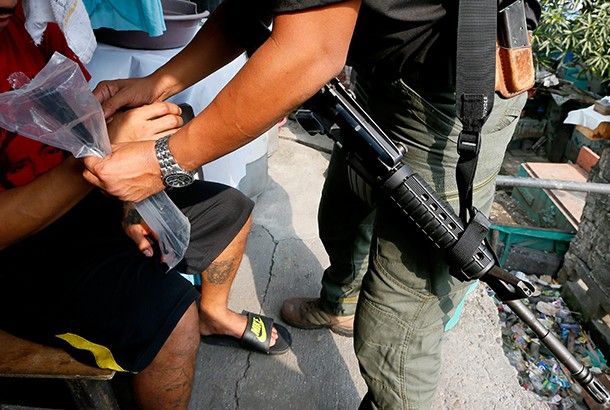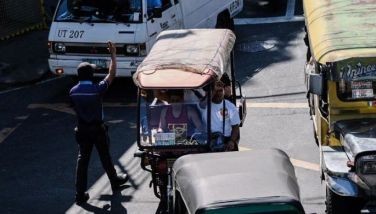HRW: Duterte's periodic martial law threats 'extremely chilling'
March 28, 2017 | 5:18pm

An arrested drug suspect is cuffed with plastic tie cables by agents of the Philippine Drug Enforcement Agency (PDEA) following a raid at an informal settlers' community inside the sprawling compound of a public cemetery Thursday, March 16, 2017 in suburban Quezon city northeast of Manila, Philippines. The drug raid came at a time that a Philippine lawmaker has filed an impeachment complaint against President Rodrigo Duterte for the thousands of deaths in his anti-drug crackdown and for alleged corruption.
AP Photo / Bullit Marquez
MANILA, Philippines — The Human Rights Watch said President Rodrigo Duterte's repeated floating of martial law in a country that lived under two decades of Marcos dictatorship is extremely chilling.
Imposing martial rule would also lead to an "immeasurably worse" future for the country given Duterte's bloody war on drugs, Human Rights Watch Asia Deputy Director Phelim Kine said in a recent interview with the Carnegie Council for Ethics in International Affairs.
"One thing that is worth noting is that when President Duterte comes under criticism about this killing campaign, he often says that things could get worse because he could just declare martial law. This is something that is extremely chilling for Filipinos who lived under the two-decade Marcos dictatorship," Kine said.
Duterte, who declared a state of natural emergency in response to a bombing in Davao City last September, has mentioned declaring martial law in Mindanao to curb extremism and crime.
"The fact that he is willing to say that with such regularity really sends some chills up people's spines, because that would make things immeasurably worse."
Kine called for an urgent investigation by the United Nations on the drug killings, saying that the Duterte administration and the Philippine National Police are incapable of addressing the issue with the level of seriousness it requires.
"In just over eight months, 7,000 Filipinos have been killed. We're talking some of the poorest, most marginalized citizens of the Philippines, the residents of urban slums, who have been shot, stabbed, thrown to the side of the road by either police or 'unidentified gunmen.' The government, rather than addressing this as a national emergency and seeking to protect these citizens, has been an enthusiastic cheerleader for this killing and has encouraged it to continue," he said.
"What it requires is a United Nations special investigation into what's going on. Unless that happens, and unless there is prolonged, sustained exposure of what's going on, things are only going to get worse," he said.
The PNP has disputed the number of extrajudicial killings and has said the term was just an invention of media.
"So forget about ‘EJK,’ don’t use that term. Those killings were not sponsored by the state, or by the PNP. In fact we’re prosecuting policemen involved in wrongdoing," PNP Director General Ronald Dela Rosa told reporters on Tuesday.
The PNP Directorate for Investigation and Detective Management has recorded 6,011 homicide cases. Of that number, 1,398 have been confirmed drug-related and 3,785 are still being investigated.
A report by the HRW earlier this month pointed out that patterns in drug killings suggest police involvement. Meanwhile, Duterte in multiple occasions assured police he would protect them.
The HRW has been documenting extrajudicial killings, which it noted as a problem in the Philippines for a long time. Kine attributed the issue to a weak rule of law, the proliferation of weaponry in the hands of people who shouldn't have it and death squads set up by local governments as a crime solution.
Duterte, himself, was alleged to be behind the formation of the Davao Death Squad (DDS) during his stint as the mayor of Davao City. Self-confessed hitman Edgar Matobato told the Senate that the death squad killed about 1,000 people from 1993 to 2013 allegedly under orders of Duterte.
The president has since denied the allegations.
"What we're warning both the Philippine government and the international community is that once you let death squads off the leash, once people know that they can get away with murder, anybody with a gun and a grudge can kill with impunity, and it's really hard to get those people back on the leash.
BrandSpace Articles
<
>
Philstar
x
- Latest
- Trending
Trending
Latest
Trending
Latest
Recommended


























